Biden Orders Pentagon To Prepare For More Attacks By Iran Proxies
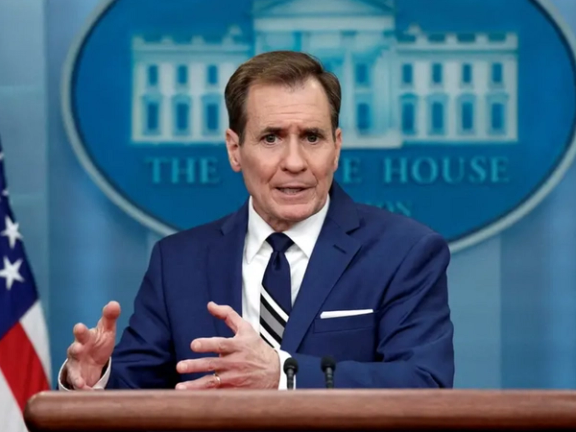
The White House on Monday said Iran was in some cases "actively facilitating" rocket and drone attacks by Iranian-backed proxy groups on US military bases in Iraq and Syria.

The White House on Monday said Iran was in some cases "actively facilitating" rocket and drone attacks by Iranian-backed proxy groups on US military bases in Iraq and Syria.
Speaking about the uptick in Iranian proxy attacks on US forces, White House spokesman John Kirby said that President Biden has directed the Department of Defense to brace for more and respond appropriately.
He reiterated that there had been an uptick in such attacks over the last week, and especially over the last few days, but the US would not allow threats to its interests in the region to "go unchallenged."
He said the United States believed these groups were supported by Iran's Islamic Revolutionary Guard (IRGC) and the Iranian government, which was also continuing to support the Hamas and Hezbollah militant groups.
"We know that Iran is closely monitoring these events, and in some cases, actively facilitating these attacks and spurring on others who may want to exploit the conflict for their own good, or for that of Iran," he said.
There has been an increase in attacks on U.S. forces since the conflict in Israel intensified on October 7 when militants from the Palestinian group Hamas launched a brutal attack on southern Israel.
"We are deeply concerned about the potential for any significant escalation of these attacks in the days ahead," Kirby said.
Biden has sent naval power to the Middle East in the past two weeks, including two aircraft carriers, other warships and about 2,000 Marines.
"We know Iran's goal is to maintain some level of deniability here, but we're not going to allow them to do that," Kirby said. "We also are not going to allow any threat to our interests in the region to go unchallenged."

Iranian authorities are trying to discreetly bury a teenage girl injured in an encounter with hijab police and is near death in a bid to prevent fresh protests.
Iran International has learned that Armita Gravand's family is being pressured by the authorities to relocate her body in silence from Tehran to Jafar Abad, Kermanshah, in the event of her death.
Armita, a high school student, fell into a coma on October 1st after an encounter with hijab enforcers in Tehran subway. She has been under a tight police cordon in Tehran’s Fajr Hospital to prevent photos or information from leaking to the public. The Iranian state media has since reported that the 16-year-old is braindead.
"Follow-ups on the latest health condition of Geravand indicate that her condition of being brain dead seems certain despite the efforts of the medical staff," state media reported.
Hengaw Human Rights Organization, which reported the incident first, also confirmed the deterioration of her condition, stating that the medical team told her family there is no chance for her recovery.
No specific time has been announced to the family, but the government intends to avoid provoking public reaction by making a silent move, Iran International has been told.
The clerical regime fears a reaction similar to what took place after Mahsa Amini's death, which resulted in months of anti-establishment demonstrations and the 'Women, Life, Freedom' movement last year.
On the first anniversary of Mahsa Amini's death in mid-September, Iran's parliament passed a stringent 'hijab bill,' which, if violated, can lead to sentences of up to ten years in prison. While women have been required to wear the hijab by Iran's theocratic establishment since the 1979 revolution that overthrew the secular Shah, the 'Women, Life, Freedom' movement has prompted more women to appear unveiled in public places, including malls, restaurants, and shops.
There are similarities between Mahsa and Armita's cases, as the regime has denied any wrongdoing but compelled the families to refrain from speaking with the media. The human rights community is concerned that both may face a similar fate.
According to information acquired by Iran International, additional family members and relatives of Armita Gravand have faced threats and have been prohibited from discussing her condition with the media. Security forces have conveyed to the Gravand family that Armita's transfer out of Tehran is under the direct orders of Iran's Leader, Ali Khamenei.
The Gravand family and their relatives even fear that they won't be able to freely discuss Armita at home, as per the source. They are concerned that security agents may have installed eavesdropping devices or cameras in their residences, leaving them feeling unsafe in their own homes.
Her parents were also forced to sign a document committing not to file a complaint against "any individual, organization, or entity."
Human rights groups and UN officials have previously accused Iranian authorities of pressuring families of deceased protesters to make statements in support of the government's narrative.
Amnesty International has called upon the international community to demand the Iranian authorities allow an independent international delegation, including UN experts, to investigate the circumstances surrounding the hospitalization of Armita Gravand.
Amini and the 'Women, Life, Freedom' movement in Iran, were honored last week with the Sakharov Prize, the European Parliament's highest honor for human rights. This follows the award of the Nobel Peace Prize to Iranian activist Narges Mohammadi this month.
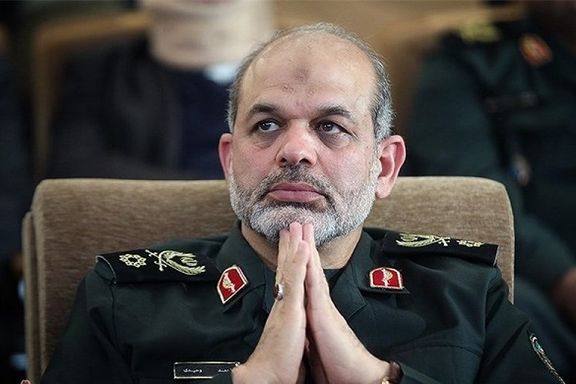
Iran's Minister of Interior has announced that more than one million ID cards have been issued to foreign residents with plans to include more.
Ahmad Vahidi explained that rather than a national ID card like Iranian citizens, foreign nationals will be assigned an identification number that serves a similar function.
Iranian officials report that the country is currently home to an estimated five million Afghan residents, of which only 780,000 hold official refugee status, leaving the majority undocumented. Some estimates even suggest the Afghan population may be as high as eight million.
The rapid growth of the Afghan population in Iran has sparked contentious debate, with many fearing that the regime is trying to bolster support amidst rising discontent, offering incentives like subsidized energy and food.
The move could also be aimed at addressing concerns related to population decline or even to strengthen the proxies by recruiting young Shiite Hazara Afghans to the regime's forces.
Opinion is divided. Last month, lawmaker Mohsen Pirhadi stated, "The matter of Afghan migration to Iran should not be exclusively seen through a negative or problematic lens, nor should it be regarded as an undesirable social phenomenon."
According to the latest figures communicated by the Government of Iran to the UN's refugee commission (UNHCR), 762,000 refugees live in Iran, of which 750,000 are Afghans and 12,000 are Iraqis. Around 586,000 Afghan passport holders with Iranian visas also live in Iran.
The UNHCR claims that in 2022, the government of Iran undertook a headcount of all undocumented Afghan nationals in the country, including those who newly arrived following the Taliban takeover in 2021, through which some 2.6 million Afghans were registered. According to official figures from Iran, at least 500,000 undocumented Afghans did not participate in the headcount.

The outspoken leader of Iran's Sunnis, Mowlavi Abdolhamid, described Friday's mass arrest of 50 worshipers and citizens of Zahedan as "provocative."
The roundup of worshippers included 13 children and is part of a weekly system of oppression of the country's Sunni minority who see constant threats of arrest and even state sponsored violence.
The incident happened following last week's Friday prayer in commemoration of the lives lost last year in the Bloody Friday tragedy where state security murdered close to 100 civilians, including women and children.
"After Friday prayers, people should return to their homes with silence and remembrance of the Almighty ... but the extensive presence of forces on the streets surrounding the mosque and prayer ground further agitates the people," he said.
"When the youth see that the authorities have arrived in such numbers, it stirs up emotions ... but if these authorities were not present, there would be no problem."
Bloody Friday initially began with protesting worshippers gathering after a police commander sexually assaulted a young Baluch girl a few weeks earlier and resulted in one of the most bloody days of the uprising which followed the death in morality police custody of Mahsa Amini.
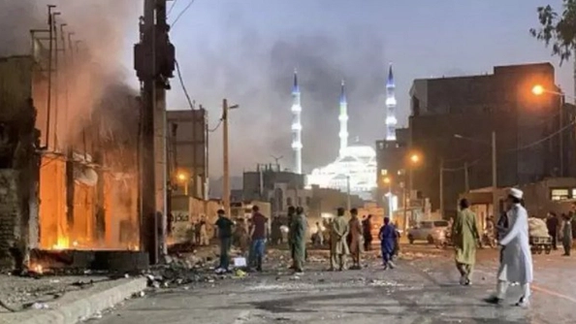
At that time, nationwide anti-regime protests were also taking place, following the death of Mahsa Amini in hijab police custody in mid-September 2022. The protests in Zahedan were seen by the regime as another serious challenge and they acted more brazenly than in Shiite cities, opening direct fire at protesters.
Abdolhamid also stressed that after more than a year, "no proper steps have been taken to heal the pains" of the families of the victims of Bloody Friday. "The greatest pain and distress of the people, whose family members were martyred on that fateful day in Zahedan on the 8th of Mehr, 1401, is that, unfortunately, no proper attention has been given to this matter, and no significant steps have been taken to address their suffering."
Since then, this Sunni-majority city has been a scene of week-round protests, which follow the sermons delivered by their Friday prayer leader, Mowlavi Abdolhamid.
The Sunni cleric stated that worshippers should return home "in silence and remembrance of God after Friday prayer"; however, the presence of security forces around the mosque is likely to exacerbate the situation and "provoke" people.
Videos posted on social media by the US-based Human Rights Activists News Agency (HRANA) show special guard forces surrounding the Makki Mosque and significant force used when arresting citizens in the city.
A number of activists and community leaders have expressed their support for the people of Zahedan, including Iran's exiled prince, Reza Pahlavi. He reacted to the incident Friday by blaming the regime for responding to "peaceful chants with a violent crackdown— including against children."
"The regime occupying our country is the godfather of terrorism in the Middle East," he wrote on X. "No Iranian, Israeli, or Arab will be safe as long as this criminal regime is in power. Lasting peace in the Middle East can come sooner than expected if the world takes real action to help the Iranian people overthrow this terrorist empire."
Moreover, Fazl ul-Rahman Kouhi, the Friday prayer Imam of Pashamag village in Sarbaz County, Sistan and Baluchestan, and a number of his companions were arrested by the security forces on Sunday after meeting Abdolhamid in Zahedan.
Kouhi, who was recently released after a long period of imprisonment, had said before his arrest in response to Friday's crackdown on protesters that "the attack of military forces on the worshipers in Zahedan is no less oppressive than the actions of Israel against the people of Palestine."
Friday protests in Zahedan were documented on social media, with slogans expressing opposition to Iran's current policy of supporting Hamas and Hezbollah. Participants chanted "Neither Gaza nor Lebanon, My Life for Iran" and "From Zahedan to Gaza, the Whole World Shakes."
Abdolhamid, renowned for his outspoken views, has expressed his criticism of Hamas' declaration of war against Israel on October 7. "We will not blindly support a Muslim who goes too far and ignores international law and attacks women and kills children," he said, going against the regime's rhetoric that Hamas must continue to crush Israel until it no longer exists.
His sermons were seen as an implicit reaction to Iran's Leader Ali Khamenei's lauding Hamas' "epic" attacks on Israel.
The Khamenei-affiliated Kayhan newspaper attacked Abdolhamid, calling him a "Mossad agent".
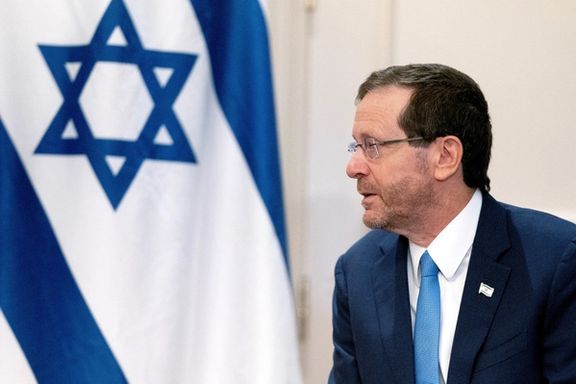
Israeli President Isaac Herzog has revealed that Hamas terrorists responsible for the October 7 massacre in Israel were carrying instructions for using cyanide bombs.
Herzog said the Israel Defense Forces (IDF) discovered a USB drive on one of the dead militants containing instructions for constructing a cyanide dispersion device.
The surprise attack on October 7 when thousands of terrorists infiltrated Israel after thousands of rockets rained down from Gaza, saw over 1,400 civilians slaughtered and hundreds more soldiers. At least 212 hostages are now being held by Hamas in the Gaza Strip.
During an interview with the Sky News, Herzog said the origin of the instructions could possibly be traced back to a 2003 Al Qaeda blueprint for chemical weaponry.
Herzog stated, "It's Al Qaeda material. Official Al Qaeda material. We are dealing with ISIS, Al Qaeda, and Hamas."
"What we went through is evil. We have to uproot it, and when you uproot evil, you see people supporting evil, you see them in demonstrations in London or anywhere else in the world. Why are you supporting evil? What's the story? Do you really believe that human beings need to be tortured? Civilians, pregnant women?" he added.
With the majority of Hamas' capabilities coming from its main backer, Iran, the link to cyanide capabilities coming from the regime cannot be ruled out either with the regime having long links to chemical warfare.
A 1990 US Department of Defense report concluded that both Iran and Iraq used chemical weapons in Halabja during the Iran-Iraq war. Iran allegedly attacked the town with cyanide gas bombs and artillery, and Iraqi forces allegedly used a mixture of mustard gas and nerve agents.
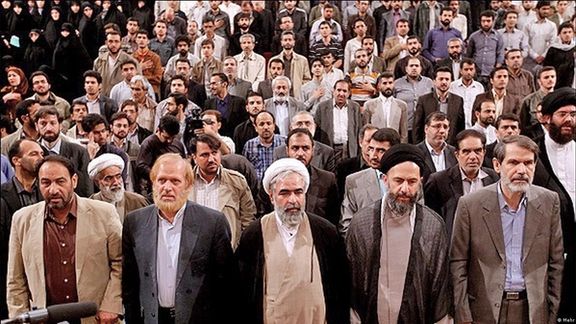
Leaders of Iran’s ultra-hardliner Paydari (Steadfastness) Party have been conspicuously silent about the war in Gaza despite being vocal about domestic issues.
The secretary general of the party, Sadegh Mahsouli, and the chairman of the party’s central council, Morteza Aghatehrani, have not made any public comments about the war raging in the Middle East. Considering that they are close allies with many top officers of the Revolutionary Guard, the reason for their silence remains a mystery.
The Paydari party has its tentacles in all government institutions including the parliament where their members form a very influential minority that often takes a leading role amid the weak presence of established conservative and reformist parties.
Paydari, which has always expressed maximum hostility towards Israel, however, in a statement earlier this month called the Hamas attack on Israel a “triumphant” operation and congratulated the “Palestinian resistance groups’ command”.
Mahsouli and Aghatehrani’s silence is particularly notable, as many other politicians -- including reformists such as the former President Mohammad Khatami whose rhetoric against Israel is generally very mild in comparison with hardliners -- have extensively condemned Israel in the past two weeks.
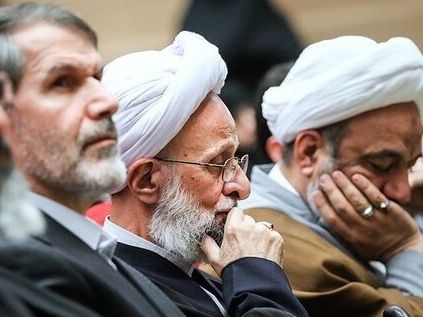
Mahsouli, a former Revolutionary Guard officer and a business tycoon who served in the government of the hardliner President Mahmoud Ahmadinejad as minister of interior and minister of welfare and social security, has been the party’s leader in the past three years.
Many believe Mahsouli, then interior minister, was the man behind the alleged rigging of the 2009 elections which secured a second term for the incumbent Mahmoud Ahmadinejad. He is among the officials of the Islamic Republic designated by the European Union.
Aghatehrani who is the chairman of the parliament’s cultural committee this week spoke to the media about the upcoming elections of the parliament and Assembly of Experts in March.
The Assembly, a constitutional body, is tasked with selecting the Islamic Republic’s next supreme leader. Reformists allege the party is planning to manipulate the assembly’s elections to suit its own interests.
Aghatehrani is known for having been a protégé of Ayatollah Mohhammad-Taqi Mesbah-Yazdi. The sixty-six-year-old cleric studied at Canada’s McGill; a university very popular with Mesbah-Yazdi’s circle in the early 1990s.
Aghatehrani then obtained a US Green Card while studying for a PhD in Middle East Studies at the State University of New York at Binghampton. There, he founded the Islamic Institute of New York and Razi Islamic school in Woodside.
Aghatehrani returned to Iran and to Mesbah-Yazdi’s famous Imam Khomeini Institute, a seminary in Qom, in 2004. A year later when Ahmadinejad was first elected to presidency, Aghatehrani was invited to join his government as the cabinet’s “ethics teacher”.
The party, and Aghatehrani as a lawmaker, are said to be behind a drive to purge government institutions of all rival factions and “Islamization” of the Iranian society including imposing tighter control on universities and other educational institutions, strict enforcement of compulsory hijab, and controlling the media and the cyberspace.
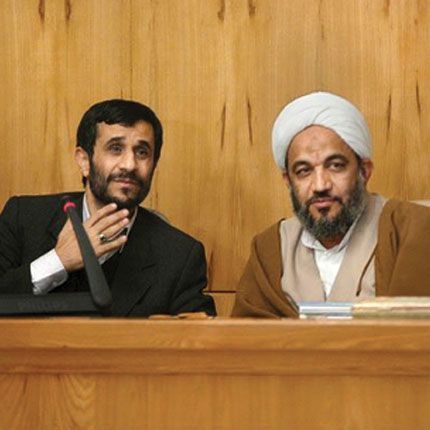
The drive to establish Paydari’s monopoly in the government and higher education came to be known as “the purification project.” Former parliament speaker and moderate conservative Ali Larijani, who among others oppose hardliners and are seen as centrists in Iranian politics, coined the term in May indirectly attacking the Paydari.
Paydari members had circulated a rumor that Larijani was trying to head an electoral block for the March parliamentary elections. “There is no talk about the elections or a nationwide slate, nor is there any consultation with other [political groups]. Therefore, the purification [-seeking] current need not worry,” Larijani responded in a brief letter and added that his ultra-hardliner rivals who blocked him from running in the presidential elections of 2020 could not expect to “create fake rivalry” and interest in the parliamentary elections.